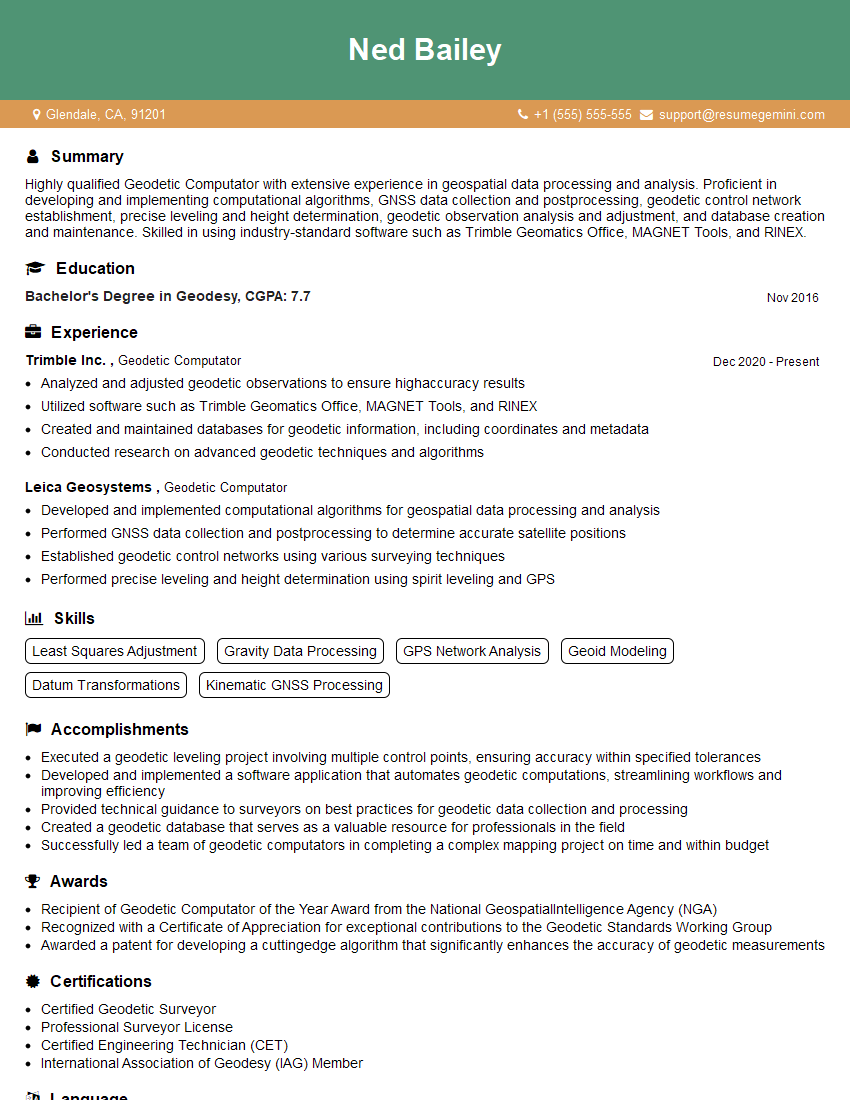Are you a seasoned Geodetic Computator seeking a new career path? Discover our professionally built Geodetic Computator Resume Template. This time-saving tool provides a solid foundation for your job search. Simply click “Edit Resume” to customize it with your unique experiences and achievements. Customize fonts and colors to match your personal style and increase your chances of landing your dream job. Explore more Resume Templates for additional options.

Ned Bailey
Geodetic Computator
Summary
Highly qualified Geodetic Computator with extensive experience in geospatial data processing and analysis. Proficient in developing and implementing computational algorithms, GNSS data collection and postprocessing, geodetic control network establishment, precise leveling and height determination, geodetic observation analysis and adjustment, and database creation and maintenance. Skilled in using industry-standard software such as Trimble Geomatics Office, MAGNET Tools, and RINEX.
Education
Bachelor’s Degree in Geodesy
November 2016
Skills
- Least Squares Adjustment
- Gravity Data Processing
- GPS Network Analysis
- Geoid Modeling
- Datum Transformations
- Kinematic GNSS Processing
Work Experience
Geodetic Computator
- Analyzed and adjusted geodetic observations to ensure highaccuracy results
- Utilized software such as Trimble Geomatics Office, MAGNET Tools, and RINEX
- Created and maintained databases for geodetic information, including coordinates and metadata
- Conducted research on advanced geodetic techniques and algorithms
Geodetic Computator
- Developed and implemented computational algorithms for geospatial data processing and analysis
- Performed GNSS data collection and postprocessing to determine accurate satellite positions
- Established geodetic control networks using various surveying techniques
- Performed precise leveling and height determination using spirit leveling and GPS
Accomplishments
- Executed a geodetic leveling project involving multiple control points, ensuring accuracy within specified tolerances
- Developed and implemented a software application that automates geodetic computations, streamlining workflows and improving efficiency
- Provided technical guidance to surveyors on best practices for geodetic data collection and processing
- Created a geodetic database that serves as a valuable resource for professionals in the field
- Successfully led a team of geodetic computators in completing a complex mapping project on time and within budget
Awards
- Recipient of Geodetic Computator of the Year Award from the National GeospatialIntelligence Agency (NGA)
- Recognized with a Certificate of Appreciation for exceptional contributions to the Geodetic Standards Working Group
- Awarded a patent for developing a cuttingedge algorithm that significantly enhances the accuracy of geodetic measurements
Certificates
- Certified Geodetic Surveyor
- Professional Surveyor License
- Certified Engineering Technician (CET)
- International Association of Geodesy (IAG) Member
Career Expert Tips:
- Select the ideal resume template to showcase your professional experience effectively.
- Master the art of resume writing to highlight your unique qualifications and achievements.
- Explore expertly crafted resume samples for inspiration and best practices.
- Build your best resume for free this new year with ResumeGemini. Enjoy exclusive discounts on ATS optimized resume templates.
How To Write Resume For Geodetic Computator
- Highlight your technical skills in computational algorithms, GNSS data processing, geodetic network analysis, and geoid modeling.
- Provide specific examples of projects where you have successfully applied your knowledge and skills.
- Demonstrate your proficiency in using industry-standard software such as Trimble Geomatics Office, MAGNET Tools, and RINEX.
- Quantify your accomplishments whenever possible, using specific metrics to demonstrate the impact of your work.
- Network with professionals in the field and attend industry events to stay up-to-date on the latest developments.
Essential Experience Highlights for a Strong Geodetic Computator Resume
- Develop and implement computational algorithms for geospatial data processing and analysis.
- Perform GNSS data collection and postprocessing to determine accurate satellite positions.
- Establish geodetic control networks using various surveying techniques.
- Perform precise leveling and height determination using spirit leveling and GPS.
- Analyze and adjust geodetic observations to ensure high-accuracy results.
- Create and maintain databases for geodetic information, including coordinates and metadata.
- Conduct research on advanced geodetic techniques and algorithms.
Frequently Asked Questions (FAQ’s) For Geodetic Computator
What are the primary responsibilities of a Geodetic Computator?
The primary responsibilities of a Geodetic Computator include developing and implementing computational algorithms for geospatial data processing and analysis, performing GNSS data collection and postprocessing, establishing geodetic control networks, performing precise leveling and height determination, analyzing and adjusting geodetic observations, creating and maintaining databases for geodetic information, and conducting research on advanced geodetic techniques and algorithms.
What are the key skills required for a Geodetic Computator?
Key skills for a Geodetic Computator include proficiency in computational algorithms, GNSS data processing, geodetic network analysis, geoid modeling, datum transformations, and kinematic GNSS processing.
What is the average salary for a Geodetic Computator?
The average salary for a Geodetic Computator varies depending on experience, location, and industry. According to Glassdoor, the average salary for a Geodetic Computator in the United States is around $75,000 per year.
What are the career prospects for a Geodetic Computator?
Geodetic Computators can advance to more senior roles such as Geodetic Engineer, Geodetic Manager, or Chief Geodetic Officer. They can also specialize in areas such as geospatial data analysis, geodetic surveying, or geodetic research.
What type of education and training is required for a Geodetic Computator?
Most Geodetic Computators have a Bachelor’s Degree in Geodesy or a related field. Some may also have a graduate degree in Geodesy, Surveying, or a related field.
What are the benefits of working as a Geodetic Computator?
Benefits of working as a Geodetic Computator include the opportunity to work with cutting-edge technology, contribute to important infrastructure projects, and make a difference in the world by providing accurate and reliable geospatial data.
What are the challenges of working as a Geodetic Computator?
Challenges of working as a Geodetic Computator include working in remote or difficult conditions, dealing with complex data and computations, and staying up-to-date on the latest technology and techniques.